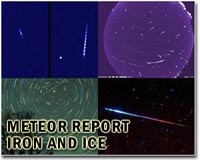 |
Kogoshima, Japan (UPI) May 17, 2011 A Japanese geologist says he's discovered the oldest known bits of micrometeorites -- space dust -- to have fallen on the Earth, 240 million years ago. Tetsuji Onoue of Kagoshima University was studying a form of microcrystalline quartz from Ajiro Island off the southern coast of Honshu, Japan, when he made the discovery, PhysOrg.com reported Tuesday. About 30,000 tons of space dust, mostly from comets and asteroids, falls on the Earth every year but is very hard to find due to the particles' small size and the way they scatter about after falling. To have survived intact for 240 million years, Onoue's specimens would have had to first survive being burned up completely in the atmosphere, the fate of 90 percent of space dust arriving at Earth, then would have had to fall into some sediment that would encase them and hold their delicate structures safely in place for all those thousands of centuries. Onoue's microscopic iron rich spheroids are about 50 million years older than any other space dust ever found on Earth. The samples will help geologists piece together the puzzle of accretion -- the addition of new material added to the surface of the Earth -- and whether there are, or were, patterns of different stuff falling over time, and if so, how much, researchers said.
Share This Article With Planet Earth
Related Links Asteroid and Comet Impact Danger To Earth - News and Science
 Meteor shower approaching peak
Meteor shower approaching peakLondon (UPI) Apr 22, 2011 Skywatchers hoping for an impressive astronomical display say the Lyrid meteor shower should reach its peak over the next two days, experts in Britain said. Astronomers said the Lyrid shower can be fickle but under ideal conditions 10 to 20 meteors an hour may be visible to watchers, the BBC reported Friday. Light from the moon, which is in a so-called gibbous phase around the fu ... read more |
|
| The content herein, unless otherwise known to be public domain, are Copyright 1995-2010 - SpaceDaily. AFP and UPI Wire Stories are copyright Agence France-Presse and United Press International. ESA Portal Reports are copyright European Space Agency. All NASA sourced material is public domain. Additional copyrights may apply in whole or part to other bona fide parties. Advertising does not imply endorsement,agreement or approval of any opinions, statements or information provided by SpaceDaily on any Web page published or hosted by SpaceDaily. Privacy Statement |